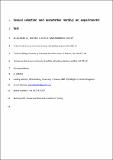Sexual selection and assortative mating : an experimental test
Abstract
Mate choice and mate competition can both influence the evolution of sexual isolation between populations. Assortative mating may arise if traits and preferences diverge in step, and, alternatively, mate competition may counteract mating preferences and decrease assortative mating. Here, we examine potential assortative mating between populations of Drosophila pseudoobscura that have experimentally evolved under either increased (‘polyandry’) or decreased (‘monogamy’) sexual selection intensity for 100 generations. These populations have evolved differences in numerous traits, including a male signal and female preference traits. We use a two males: one female design, allowing both mate choice and competition to influence mating outcomes, to test for assortative mating between our populations. Mating latency shows subtle effects of male and female interactions, with females from the monogamous populations appearing reluctant to mate with males from the polyandrous populations. However, males from the polyandrous populations have a significantly higher probability of mating regardless of the female's population. Our results suggest that if populations differ in the intensity of sexual selection, effects on mate competition may overcome mate choice.
Citation
Debelle , A , Ritchie , M G & Snook , R R 2016 , ' Sexual selection and assortative mating : an experimental test ' , Journal of Evolutionary Biology , vol. 29 , no. 7 , pp. 1307-1316 . https://doi.org/10.1111/jeb.12855
Publication
Journal of Evolutionary Biology
Status
Peer reviewed
ISSN
1420-9101Type
Journal article
Description
This work was funded by the Marie Curie Initial Training Network ‘Understanding the evolutionary origin of biological diversity’ (ITN-2008-213780 SPECIATION) and by a US National Science Foundation grant (DEB 0093149) and NERC grants (NE/B504065/1; NE/D003741/1) to RRS.Collections
Items in the St Andrews Research Repository are protected by copyright, with all rights reserved, unless otherwise indicated.

